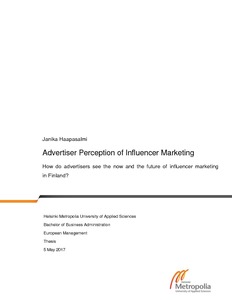Advertiser Perception of Influencer Marketing : How do advertisers see the now and the future of influencer marketing in Finland?
Haapasalmi, Janika (2017)
Lataukset:
Haapasalmi, Janika
Metropolia Ammattikorkeakoulu
2017
All rights reserved
Julkaisun pysyvä osoite on
https://urn.fi/URN:NBN:fi:amk-2017052610489
https://urn.fi/URN:NBN:fi:amk-2017052610489
Tiivistelmä
The thesis is built around a research study on the advertiser perception of influencer marketing in Finland today and in the future. The aim of the research was to discover brand marketers’ perception of the current and future state of influencer marketing as a marketing method and as an industry as a whole.
Academic sources on marketing, consumers, marketing promotions, targeting and finally influencers and influencer marketing were used to collect information and to further deepen the researcher’s knowledge on the topic.
The research was conducted using a quantitative survey research approach to the descriptive marketing research method. The researcher conducted a survey questionnaire that was sent out to numerous brand marketers operating in the Finnish market to collect a wide and general overview of the industry and the advertisers’ attitude towards influencer marketing.
Based on the research results, influencer marketing seems to be perceived as an interesting and important tool for conveying a brand’s marketing message to their consumer-customers. Most marketers in Finland plan on working with influencers within the next three years. Whereas social media influencers were perceived to only consist of bloggers before, the future holds more doors open to other types of influencers as well.
The main challenge advertisers currently face with influencer marketing is the difficulty of measuring its results in a quantitative matter and determining the true return on investment. Advertisers identify the potential that influencer marketing holds, but also would need more data to prove its efficiency to the organizations top-level management.
Academic sources on marketing, consumers, marketing promotions, targeting and finally influencers and influencer marketing were used to collect information and to further deepen the researcher’s knowledge on the topic.
The research was conducted using a quantitative survey research approach to the descriptive marketing research method. The researcher conducted a survey questionnaire that was sent out to numerous brand marketers operating in the Finnish market to collect a wide and general overview of the industry and the advertisers’ attitude towards influencer marketing.
Based on the research results, influencer marketing seems to be perceived as an interesting and important tool for conveying a brand’s marketing message to their consumer-customers. Most marketers in Finland plan on working with influencers within the next three years. Whereas social media influencers were perceived to only consist of bloggers before, the future holds more doors open to other types of influencers as well.
The main challenge advertisers currently face with influencer marketing is the difficulty of measuring its results in a quantitative matter and determining the true return on investment. Advertisers identify the potential that influencer marketing holds, but also would need more data to prove its efficiency to the organizations top-level management.
